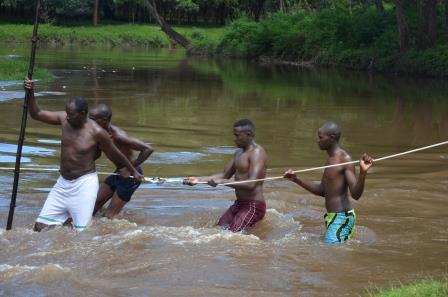At least 6,000 households from Visoi ward in Rongai Sub-County will have access to clean and reliable water supply after the Nakuru County government commissioned a Sh52 million worth water project in the area.
Governor Susan Kihika who inaugurated the Umoja Water Project that was co-funded by the County Government and World Vision, said that similar projects were being initiated in all the 11 sub-counties so that both humans and livestock could have access to clean water.
The Governor regretted that Rongai residents who mostly depended on seasonal rivers, were the most affected by water scarcity in the County adding that other groups in the Sub- County including water user groups, local institutions and organizations responsible for providing water services would also benefit from the water project in addition to having their capacity and efficiency enhanced.
She added that the County was targeting to ensure that at least 80 percent of households’ access clean water for domestic and commercial use in the next three years.
“We are optimistic that this project will radically change the lives of our people,” said Ms. Kihika.
The Governor explained that the rehabilitation of the project that was currently serving over 12,500 residents across seven villages, including Lusaka, Umoja, and Tumaini, involved drilling of three boreholes, solarization, construction of elevated steel tanks, and setting up automated water kiosks to provide clean and reliable water to households, schools, and healthcare facilities.
Ms. Kihika said for many years, most rural parts of Nakuru had to contend with the threat of water borne diseases including bilharzia, diarrhea and others and was happy that Rongai residents would have a sigh of relief since the occurrence of this diseases have been brought to a control by the availability of the clean water from the new project.
Ms. Kihika affirmed that her administration was working with the national government, development partners and donors in alleviating water problems in Nakuru County and assured improved livelihood for the locals.
According to the County boss, the devolved unit has spent more than Sh800 million in the improvement and establishment of water supply infrastructure with over 70 percent of the water projects having been completed and commissioned across the 11 sub-counties while a few others were nearing completion.
She disclosed that more than 100,000 families residing in Bahati, Rongai and Subukia sub-counties were also set to benefit from the Sh15 million Morop dam water project which was expected to supply water to over 50 communal water points, 7 secondary schools, 12 primary schools, dispensaries and Kabarak University which have been afflicted with perennial water shortage for a long time.
The Governor said the move to find long and short-term water shortage solutions would contribute towards sustainable development in the county and cited Nakuru Water and Sanitation Services Company (Nawassco) which she said has a capacity of producing 45,000 cubic metres of water daily against a demand of 70,000 cubic metres.
She went on to say that to plug the deficit in Nakuru city and all the other 10 sub-counties, the County needed to invest heavily by drilling boreholes, construction of dams and also sharing water resources from other counties.
The Governor added that water coverage in the county had increased to more than 60 percent up from 42 percent five years ago through drilling of boreholes, increased water connections and rehabilitation of existing water projects.
The County Government has also commissioned a Sh5 million water project located at Ndabibi Secondary School in Naivasha Sub-County which is serving the community and institutions in the area.
The County Government has also invested Sh42 million in water projects in Keringet Ward, Kuresoi South since 2018.
The Governor said major long-term solutions were in the works including the construction of Itare Dam in Ndoinet Kuresoi North by the national government in partnership with Rift Valley Water Services Board which oversees the development and management of water resources in eight counties including Nakuru and Baringo.
Itare Dam, whose construction stalled after its contractor Cooperativa Muratoi Cementisti Di Ravenna filed for bankruptcy five years ago, was expected to provide clean drinking water to about 800,000 residents of Nakuru County. The dam is expected to yield 100,000 cubic meters of water per day.
Governor Kihika urged Nakuru residents to also play their part in conserving water adding that various short-term measures have been put in motion including rationing where necessary, water distribution by tankers where the County has committed 16,000 litre tankers to deliver water to critical areas and facilities like hospitals.
She also urged farmers to invest in rainwater harvesting structures such as water pans which would help store water when the rain season starts thus averting water shortage.
The Governor was happy that the County Assembly had endorsed several legislations aimed at conserving the environment, adding that people have encroached and cultivated around rivers posing a danger to catchment areas and called on those living along rivers to plant more trees.
By Esther Mwangi and Felistas Kahungu




